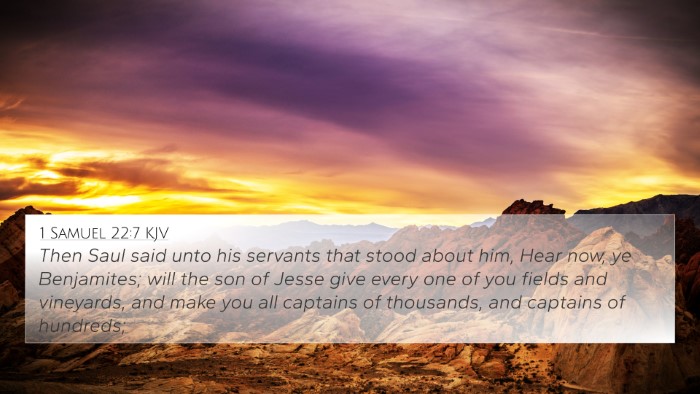Understanding 1 Samuel 23:19
1 Samuel 23:19 states: "Then came up the Ziphites to Saul to Gibeah, saying, Doth not David hide himself with us in strong holds in the wood, in the hill of Hachilah, which is on the south of Jeshimon?" This verse presents a crucial episode in the narrative of David's flight from Saul, highlighting the tension between David and Saul and the complexities of alliances in ancient Israel.
Contextual Analysis
This verse occurs during a turbulent time for David, as he is being hunted by King Saul due to rising jealousy and fear of David's growing popularity and potential claim to the throne. The Ziphites, a tribe from the region of Ziph, reveal David's whereabouts to Saul, demonstrating the peril that David faced even from those he might have considered allies or neutral parties.
Commentary Insights
-
Matthew Henry's Commentary:
Henry emphasizes the betrayal of the Ziphites, who provide information to Saul, contrasting their actions with the loyalty expected among the tribes of Israel. Their actions exemplify the danger of misplaced trust and the susceptibility of individuals to political pressures, underlining the theme of divine protection over David amidst treachery.
-
Albert Barnes' Notes:
Barnes notes the strategic significance of the Ziphites’ location and their willingness to assist Saul in his pursuit of David. He points out that this incident shows the lengths to which Saul's jealousy drives him and the influence of local tribes in the political machinations of the time. Barnes also suggests that the strongholds mentioned were critical geographical points that David was utilizing for defense.
-
Adam Clarke's Commentary:
Clarke discusses the implications of this betrayal for David, reflecting on the emotional and spiritual strain that comes from constant danger and lack of trust. He posits that such experiences deepen David's reliance on God, setting the foundation for his future psalms that reflect his trust and dependence on divine help.
Thematic Connections
This verse has notable thematic connections within the Bible, particularly related to the concepts of betrayal, trust in God, and the tension between divine purpose and human politics. Here are some Bible cross-references that relate to this theme:
- Psalm 54:1-5: David cries out to God for salvation and expresses his trust in God's justice amidst betrayal.
- John 15:18-20: Jesus speaks about the reality of betrayal and suffering for the sake of righteousness, paralleling David's experiences.
- Proverbs 17:17: A friend loves at all times, but a brother is born for adversity, reflecting the importance of true loyalty.
- Matthew 26:14-16: Judas betrays Jesus, demonstrating a similar betrayal motif in the New Testament.
- 2 Samuel 16:20-23: Ahithophel betrays David, showcasing the recurring theme of treachery against God's anointed.
- Psalm 59:1-6: David's lament over those who seek his life, mirroring his sentiments in 1 Samuel 23:19.
- Ruth 1:16-17: The loyalty of Ruth to Naomi contrasts sharply with Ziphite betrayal, highlighting the spectrum of allegiance.
Inter-Biblical Relationships
This event is not an isolated occurrence but reflects larger narratives within Scripture. Analyzing connections between Bible verses allows for a deeper understanding of recurring themes across both the Old and New Testaments:
Linking Scriptures
Scriptural cross-referencing uncovers additional insights:
- The tension between leaders and the anointed, as seen in 1 Samuel 16:13-14, shows the contrast between David's divine selection and Saul's declining favor.
- In Hebrews 11:32-34, the examples of faith include David, underscoring his struggles against betrayal and persecution as part of his faith journey.
- Comparative analysis with Luke 22:47-48 brings depth to understanding the nature of betrayal in the biblical narrative.
- The warnings of Micah 7:5-6 about trusting in friends ties back to the reality David experienced with the Ziphites.
Conclusion
1 Samuel 23:19 serves as a poignant reminder of the dangers of betrayal, the importance of trust, and the reliance on divine providence amidst human treachery. When studying this verse, believers can gain insights by employing tools for Bible cross-referencing, understanding connections between Bible verses, and analyzing the thematic elements that echo throughout Scripture. This verse, alongside others like it, contributes to a richer understanding of the narrative of God's people and His sovereignty over their adversities.







